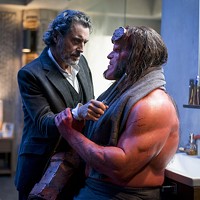

The other opening scene is even better, as a surly young man named John Constantine goes the Father Merrin route by attempting to perform an exorcism on a girl who's possessed by a snarling demon. To cast out the evil entity, Constantine requires the use of a mirror, and not since it was established that vampires cast no reflections has a looking glass been used so effectively in the battle against the dark forces.
Yes, Constantine opens like gangbusters, and the movie doesn't let up until, well, until these two scenes have run their course. After that point, the film resembles nothing so much as a punctured tire with a slow leak, letting all the air seep out until what's finally left is flat and fairly ineffectual.
That's a real shame, because on paper, this one had all the earmarks of a hit. And on paper is where this project originated. Based on the DC Comics/Vertigo series Hellblazer, the picture casts Keanu Reeves as Constantine, who's always had the ability to recognize the angels and demons that walk the earth in human form. It seems that God and Satan had long ago reached an agreement that they would not directly impact whatever events occur on our planet, but that they could use these "half-breeds" to subtly influence us mere mortals. Constantine once attempted suicide to put an end to his tortured visions, but precisely because he took his own life, he found himself in Hell for a few minutes before being resuscitated and brought back to life.
Determined not to spend eternity in Hades, Constantine now figures he can "buy" his way into Heaven by wiping out as many demonic half-breeds as possible. The androgynous angel Gabriel (Tilda Swinton), assigned by God to oversee affairs on Earth, informs Constantine that going the Charles Bronson Death Wish route won't gain him acceptance, but he perseveres nonetheless. Yet as he goes about his business, Constantine realizes that there's a seismic shift occurring in the underworld: Full-fledged demons are starting to cross over into our world, and the only way he can get to the bottom of the mystery is to join forces with a police detective (Rachel Weisz) investigating the apparent suicide of her psychic twin sister.
Constantine actually has more in common with 1990's Jacob's Ladder than with last year's comic book adaptation Hellboy in that it similarly attempts to incorporate religious and philosophical elements into its thriller framework. From the connotations of its hero's name (Constantine was the Roman emperor who endorsed Christianity more for personal gain than for any spiritual fulfillment) to depictions of Hell that borrow heavily from the works of Hieronymus Bosch, the flick tries hard to include heady material that will allow for post-screening discussions around the water cooler or in cinephile trades (something The Matrix accomplished masterfully with its rampant theology). But as was the case with the muddled Jacob's Ladder, Constantine never brings its debates into focus, choosing instead to pile on its issues like so many toppings onto a baked potato.
Scripters Kevin Brodbin and Frank Cappello, whose previous credits were vehicles for Steven Seagal (The Glimmer Man) and Hulk Hogan (Suburban Commando) respectively, have clearly bitten off more than they can chew without choking, and it becomes an exhaustive exercise to keep abreast of the story's seemingly haphazard developments. Some interesting supporting characters — a burnt out priest (Pruitt Taylor Vince) who turns to the bottle to block out his disturbing visions; a scholar (Simon Wells) who doubles as Constantine's "Q" by supplying him with neat gadgets to use against demonic forces (like a set of brass knuckles adorned with crucifixes) — are too quickly brushed aside, and even the Spear of Destiny, important enough to figure in the film's opening, becomes an afterthought by the time we get to the jumbled ending. (I first encountered that spear in a DC comic book in the 1970s, and that WWII/horror yarn has left more of a favorable impression on me over the years than this movie will in the foreseeable future.)
Director Francis Lawrence, another music video vet making a big-screen debut, comes up with some interesting visual choices but eventually finds himself getting bogged down by the laborious demands of the script. In fact, the movie so thoroughly fritters away its initial allure that by the time we witness the climactic battle for supremacy between Constantine and Gabriel and God and Satan and Satan's son, we might as well be watching an episode of the inane Survivor in which the stakes are raised to include the entire planet rather than just one patch of land. Never mind the island: Can we vote this movie out of theaters?



